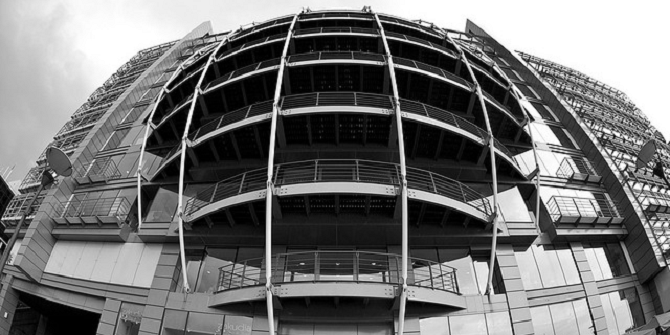 UK public broadcaster the BBC is used for news by a majority of the UK public, and for entertainment by many more. But its future funding remains uncertain. Here, Goldsmiths doctoral researcher Tom Chivers considers the case for a universal media levy to replace the current licence fee model.
UK public broadcaster the BBC is used for news by a majority of the UK public, and for entertainment by many more. But its future funding remains uncertain. Here, Goldsmiths doctoral researcher Tom Chivers considers the case for a universal media levy to replace the current licence fee model.
One month on from the UK’s 2019 general election and it is clear that the BBC is hurtling towards an existential crisis. On top of widespread accusations of news bias and editorial failure, the government is now considering whether to decriminalise non-payment of the television Licence Fee, the public broadcaster’s main source of income.
Recent debates have focussed on the BBC’s place in the media landscape: its ability to compete with streaming giants like Netflix and Amazon; how to respond to declining youth audiences; and how the BBC can be made more accountable to the public.
But knee-jerk decisions on the Licence Fee would radically diminish the Corporation’s financial security and make these other important questions irrelevant. Unless we embrace tackling the question of BBC funding, and bring the Corporation’s public funding into the modern era, there might not be a BBC left to argue about.
A voluntary or subscription-funded BBC?
The £154.50 yearly fee accounts for the vast majority of BBC income (£3.6bn, or 75%, in 2018/19) but is increasingly seen as punitive and regressive. Nearly 130,000 people were prosecuted for licence fee evasion in 2018, and the 2015 Perry Review expressed concerns that the enforcement regime predominantly impacts women and those on lower incomes. Decriminalisation would likely increase non-payment and therefore decrease the BBC’s overall budget.
Yet the most common argument against the Licence Fee is it forces viewers to pay for something they may not use, an anachronism in a media age defined by abundant choice in pay-TV, SVoDs and free online media. The Institute of Economic Affairs’ (IEA) recent proposals epitomise this attitude, arguing “it is difficult to think of a coherent argument for requiring those who wish to watch one television channel to pay for content on a different channel.”
The fundamental issue with a subscription-focused model such as that proposed by the IEA, however, is that voluntary or subscription funding breaks the essential link between the BBC and its national audience. Guaranteed public funding enables the BBC to provide services and content for all UK audiences across age, ethnicity, sexuality, nation and region. This ‘universality’ would be impossible if BBC services were required to chase subscribers, and prioritise commercially successful programming over socially vital genres like arts, education, religion and children’s content that the market struggles to supply. Any degree of subscription funding would restrict access to the full benefits of public service broadcasting (PSB) on the basis of ability to pay.
Even competitors appear to oppose a wholly subscription-funded BBC, as it would rapidly decrease the overall level of investment in the UK’s creative industries. ITV, Sky and Channel 4 all argued during the last Charter review in 2015-16 that the UK’s mixed broadcasting economy serves audience interests best through ‘competition for quality’ rather than competition for funding.
A universal media levy
The challenge lies in finding a new funding model which preserves the BBC’s essential universal link with all audiences while adapting to the changing ways viewers, listeners and online users consume media content. One option is to replace the Licence Fee with a Broadcasting Levy on all households, similar to Germany’s ‘rundfunkbeitrag’ introduced in 2013.
Switching to a Levy system has attracted support from Parliament’s Culture, Media and Sport Select Committee, the Future for Public Service Television inquiry, and the BBC itself, and entails several practical advantages over the current system:
- Funding via a household levy removes the need for a physical licence enforcement regime. Savings from a reduced TV Licencing Authority (2018/19 total cost: £102m) could then be reinvested in core public service activities.
- Additional income from households currently not paying a Licence Fee also allows for a cut in the per-household levy rate, while still maintaining the same overall level of BBC funding.
- The task of collecting the levy could be shared with bodies like local councils who already charge for services per household. This would also enable concessions to the levy rate for e.g. single occupants or welfare recipients.
The obvious drawback of a Broadcasting Levy is it is likely to be as publicly and politically unpopular as the Licence Fee, if not more so, as it would also affect people who currently don’t use any broadcasting services at all. However, such a reform would reaffirm the cultural and democratic benefits of universal public service media. The individual cost of the Levy would be returned in the value of programmes or content, is amplified further in the wider development of an informed public, a richer culture and a shared sense of community.
These goals are all the more important in light of the challenges of distrust, triviality and cynicism in public attitudes to news media, while the explosion in competing streaming services is producing greater content saturation and audience fragmentation. Far from digital technologies weakening the case for PSB, publicly-funded media with clear public purposes are needed now more than ever.
This raises the prospect that Levy spending would not need to be confined to broadcast media, or even to the BBC. A Universal Media Levy—topped up with revenue from taxes on digital media platforms—could secure fixed funding for the BBC’s core services, and also fund a range of other public media initiatives. Much like the BBC’s Local Democracy Reporting Service or Ofcom’s unsuccessful local TV scheme, such initiatives would help to improve media plurality and diversity at national, regional and local level. Unlike these projects, however, a stronger foundation in public funding would ensure investment prioritises public service objectives, instead of subsiding commercial ventures that have abdicated local and regional media.
A Public Service Media Commission
It’s also clear that decisions on the cost of a Universal Media Levy must not be controlled in the same way as the TV Licence. Negotiations in 2010 and 2015 saw the BBC’s funding cut by one-fifth in real terms and ‘top-sliced’ to pay for government spending commitments, such as national broadband rollout or the £750m cost of paying for free over-75s TV licences.
Instead, an independent Public Service Media Commission should have statutory authority to set the level of the Media Levy and award grants for other public service projects. These decisions would be agreed with the BBC, scrutinised by parliament and informed by consultation with audience groups to ensure the interests of Levy payers are met—what was previously the role of the BBC Trust before it was abolished in the 2016 Charter review.
Smash-and-grab raids undermine the independence of the BBC and are wholly unaccountable to the public and Parliament. The Prime Minister’s comments on the eve of the election, questioning whether the licence fee “still makes sense”, serve only to highlight the precarious relationship between the BBC, its funding and party politics. A new funding model is needed urgently to protect the future of public service broadcasting.
This article represents the views of the author, and not the position of the Media@LSE blog, nor of the London School of Economics and Political Science.





I would not pay anything unless the BBC radically changes it’s practice of ‘utilising’ the Billionaire press within it’s news/discussion programming. Why should I have to watch and listen to right wing ‘wisdom’ from the Spectator on Newsnight?